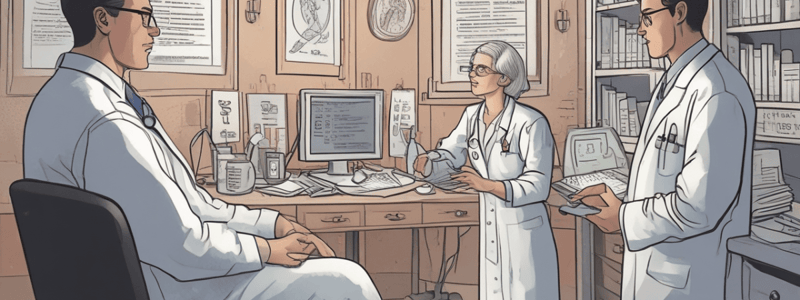Podcast
Questions and Answers
Under which circumstance can a person disclose a patient's identity without violating confidentiality?
Under which circumstance can a person disclose a patient's identity without violating confidentiality?
- To the patient's family
- Pursuant to judicial subpoena or court order (correct)
- By personal request from the patient
- For job requirements in another field
Confidentiality laws allow disclosure of patient information to any employee of the department regardless of their role.
Confidentiality laws allow disclosure of patient information to any employee of the department regardless of their role.
False (B)
Who can receive information about prescriptions for controlled substances from a pharmacist?
Who can receive information about prescriptions for controlled substances from a pharmacist?
Authorized users designated by the prescription monitoring program registry.
Confidentiality laws provide that information can be disclosed to a _____ for conducting public health research or education.
Confidentiality laws provide that information can be disclosed to a _____ for conducting public health research or education.
Match the type of disclosure with its corresponding purpose:
Match the type of disclosure with its corresponding purpose:
In what situation can a practitioner be informed about a patient's controlled substance treatment by another practitioner?
In what situation can a practitioner be informed about a patient's controlled substance treatment by another practitioner?
Only law enforcement agencies can access controlled substance information related to suspected criminal activity.
Only law enforcement agencies can access controlled substance information related to suspected criminal activity.
What role does the deputy attorney general for Medicaid fraud control play in relation to confidentiality?
What role does the deputy attorney general for Medicaid fraud control play in relation to confidentiality?
Information may be disclosed to health departments to facilitate _____ of controlled substance histories.
Information may be disclosed to health departments to facilitate _____ of controlled substance histories.
Which of the following is NOT a reason for disclosing patient information?
Which of the following is NOT a reason for disclosing patient information?
Study Notes
Confidentiality Provisions
- Individuals aware of patient or research subject identities, trade secrets, or manufacturing processes must maintain confidentiality.
- Disclosure is permissible only under specific circumstances outlined below.
Authorized Disclosures
- Department Employees: Information can be shared with others in the department who are authorized to obtain it.
- Judicial Orders: Information may be disclosed as required by subpoenas or court orders during criminal investigations.
- Regulatory Agencies: Disclosure to governmental agencies supervising licensed individuals dealing with controlled substances is allowed.
- Prescription Monitoring Program: Information can be shared with the prescription monitoring program and its authorized users.
Professional Communication
- Practitioner Notification: A practitioner can be informed if their patient is receiving controlled substances from another provider, aiding in coordinated care.
- Pharmacist Information: Pharmacists may receive information about prescriptions for controlled substances to ensure accurate controlled substance histories.
Oversight and Investigations
- Medicaid Fraud Control: Information may be shared with the Deputy Attorney General for investigations related to Medicaid fraud or abuse.
- Local Health Departments: Disclosures may occur for public health research or education under strict agreements and regulations set by the commissioner.
Investigative Entities
- Medical Examiners/Coroners: Information may be shared with medical examiners or coroners in the course of their official duties.
- Patient Access: Individuals have the right to access their controlled substance history; legal representatives may request this on behalf of patients lacking decision-making capacity.
Law Enforcement
- Suspected Criminal Activity: Appropriate law enforcement agencies may receive relevant information if there's a reasonable belief of a crime involving controlled substances.
Studying That Suits You
Use AI to generate personalized quizzes and flashcards to suit your learning preferences.
Description
This quiz covers the essential aspects of confidentiality laws related to patient information and trade secrets in healthcare. Understand the circumstances under which confidential information may be disclosed under legal and professional guidelines. Test your knowledge on the regulations governing the protection of sensitive information.




